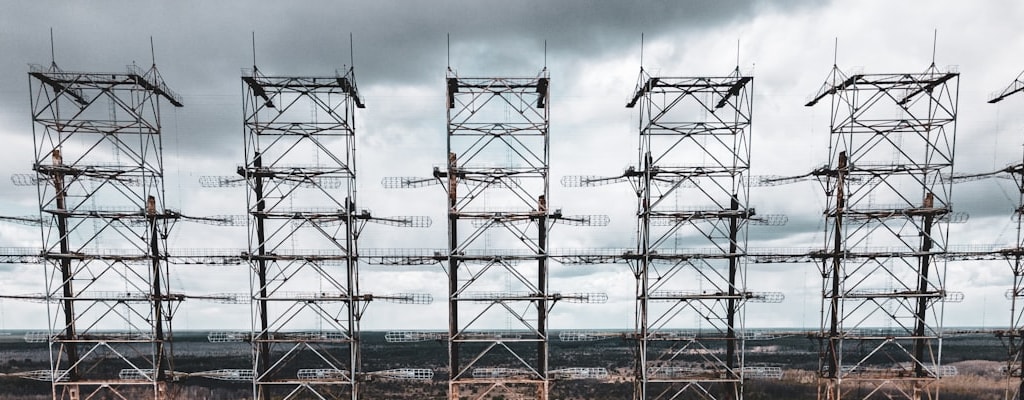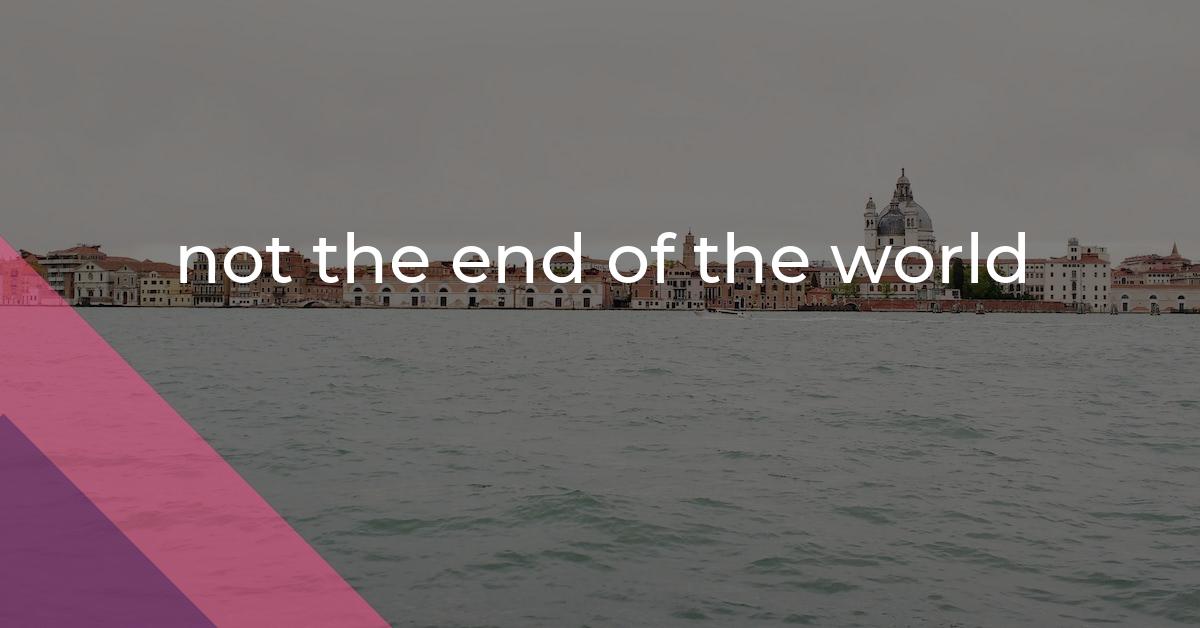not the end of the world: Idiom Meaning and Origin
What does ‘not the end of the world’ mean?
The idiom "not the end of the world" means that something is not a catastrophic or extremely serious event, even though it may feel like it at the moment.

Idiom Explorer
The idiom "put an end to" means to bring something to a conclusion or stop it completely.
The idiom "on end" means continuously or without interruption.
The idiom "oh well" is used to express resignation or acceptance of a situation that cannot be changed. It conveys a sense of letting go and moving on from disappointment or frustration.
"Not win for losing" means to experience a situation where even if you fail to achieve something, you still face negative consequences or outcomes, further worsening your position.
The idiom "not to put too fine a point on it" means to say something without being overly precise or explicit, typically to avoid causing offense or discomfort.
The idiom "not quite" means to not fully reach or achieve something, indicating a slight difference or falling just short of a particular expectation or goal.
The idiom "not much of anything" means a lack of substance, value, or importance. It implies that there is very little or almost nothing in terms of quantity, quality, or significance.
The idiomatic phrase "not long for this world" means that someone or something is expected to die or disappear soon.
The idiom "not likely" means something is improbable or unlikely to happen.
The idiom "not know which end is up" means to be completely confused or disoriented, unsure about even the most basic things.
Deciphering Catastrophe
The idiom "not the end of the world" is a commonly used expression in the English language. It suggests that a situation, while challenging or difficult, is not as catastrophic or devastating as it may initially appear. Instead of blowing it out of proportion, this phrase reminds us to keep things in perspective and not to become overly distressed or despondent in the face of adversity. It encourages us to maintain a sense of resilience and adaptability. After all, losing your job is not the end of the world. There are other employment opportunities available and there are more important things in life than work. This idiom serves as a reminder that there are always alternative perspectives and potential outcomes that can mitigate the apparent severity of any situation.
The origin of this idiom is not definitively known, but its usage can be traced back to at least the mid-20th century. It has since become a widely understood expression, reflecting the common human tendency to sometimes exaggerate the significance of a particular event or circumstance. It is important to remember that while a situation may present challenges, it is ultimately surmountable. This idiom is a linguistic tool that helps us reframe events or circumstances, allowing us to maintain a sense of resilience and adaptability in the face of adversity.
The idiom "down but not out" is closely related to the concept of "not the end of the world." It conveys a similar idea of resilience and determination in the face of adversity. This expression suggests that while someone may be experiencing difficulties or setbacks, they are not yet defeated. It emphasizes the importance of perseverance and not giving up, even when things may seem bleak. Just because you're down, doesn't mean you're out.
Another related idiom is "no biggie." This expression is used to downplay the significance or importance of a situation or event. It suggests that whatever has happened is not a big deal, and that there is no need to be overly concerned or worried about it. This idiom helps to remind us that not everything is a major catastrophe and that sometimes we need to let go of the small stuff.
Similarly, the idiom "on end" can be related to "not the end of the world." It refers to something being continuous or uninterrupted for a prolonged period of time. When used in the context of facing challenges or difficulties, it conveys the idea of persevering and enduring through the tough times without giving up. It suggests that we should keep going, even when things seem never-ending.
Lastly, the idiom "not half bad" can also be connected to "not the end of the world." It is used to describe something that is better than expected or surprisingly good. This expression reminds us to look for the positive aspects or outcomes in a situation, even when it may initially seem negative or challenging. It encourages us to have a more optimistic perspective and to find the silver lining in any situation.
The idiom "not the end of the world" captures a fundamental aspect of human nature: the tendency to sometimes magnify the significance of a particular event or circumstance. By employing this idiomatic expression, individuals can effectively communicate that while a situation may present challenges, it is not ultimately catastrophic or world-ending. The idiom allows for the recognition of alternative perspectives and potential outcomes, promoting resilience and adaptability in the face of adversity.
Example usage
Examples:
- Don't worry, losing your job is not the end of the world. You'll find another one soon.
- I know you're upset about failing the exam, but it's not the end of the world. You can always retake it.
- Breaking up with your partner may feel devastating, but remember it's not the end of the world. You will find love again.
An analysis of the idiom "not the end of the world" suggests that it is used to emphasize that a negative event or situation is not as significant or catastrophic as it may initially seem. The phrase implies that there is a more realistic or manageable perspective to consider, providing comfort and reassurance to the person experiencing the difficulty. It encourages them to maintain hope, stay calm, and adopt a positive outlook, underscoring the resilience of the individual facing the setback.
More "Catastrophe" idioms
We missed the mark - nothing found.



